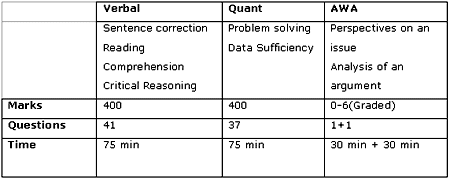The Masters in Business Administration, or MBA, is arguably the most desired degree in India. Whether you hope to work for a MNC or start your own business, you will reap huge benefits by earning an MBA abroad.
The Graduate Management Admission Test, or GMAT, is a computer based test offered world wide in test centres across the globe. Over 900 business graduate schools in the US, Canada, UK and Australia require applicants to provide a GMAT score.
The test measures verbal, mathematical and analytical writing skills and is intended to help business schools assess the potential of applicants for advanced study in business and management.
The GMAT tests the fundamental skills of applicants and does not require any subject-specific theoretical study. Let's examine the test's structure and format:
Test Structure

Analytical Writing Assessment
The GMAT begins with the Analytical Writing Assessment (AWA). The AWA consists of two separate writing tasks -- Analysis of an Issue and Analysis of an Argument.
You are allowed 30 minutes to complete each task.
The 'issue' task states an opinion on an issue of general interest. You must either agree or disagree with the opinion. It doesn't matter which side you choose, as long as you provide relevant reasons and examples to explain and support your views.
The 'argument' task presents an altogether different challenge -- it requires you to critique an argument by discussing how well reasoned you find it. You must consider the logical soundness of the argument rather than just agreeing or disagreeing with the position it presents.
These two tasks are complementary; the first requires you to construct a personal argument about an issue, and the second requires you to critique someone else's argument by assessing its claims.
Quantitative Section
The Quantitative section of the Graduate Management Admission Test measures basic mathematical skills and the understanding of elementary mathematical concepts. Specifically, it gauges your ability to reason quantitatively, solve quantitative problems and evaluate data.
Verbal Section
The Verbal section of the GMAT measures your ability to:
- read and comprehend written material (Reading Comprehension)
- reason and evaluate arguments (Critical Reasoning)
- correct written material to conform to standard written English (grammar, sentence structure and basic editing skills)
Test Format
The GMAT comprises four separately timed sections. Each of the first two sections consists of an analytical writing task; the remaining two sections (Quantitative and Verbal) consist of multiple-choice questions delivered in a computer adaptive format.
Questions in these sections are dynamically selected as you take the test. Therefore, your test will be unique, and the multiple-choice questions will adjust to your ability level.
For each multiple-choice section of the GMAT, there is a large pool of potential questions ranging from low difficulty to high difficulty. Each section of the test begins with a question of moderate difficulty.
If you answer the first question correctly, the computer will give you a harder question. If you answer the first question incorrectly, your next question will be easier.
This process will continue until you complete the section, at which point the computer will have an accurate assessment of your ability level in that subject area.
In a computer adaptive test, only one question at a time is presented. Because the computer scores each question before selecting the next one, you may not skip, return to, or change your responses to previous questions.
How to apply
Here is a simple way to register yourself for GMAT:
- Logon to www.mba.com
- Click on "Take the GMAT" link
- Click on "Check seat availability" to see whether seats in a particular month are available in a particular city or "Schedule a GMAT appointment" to book a date for the test.
- Look for the available seats in a given city and book the date of your choice.
The test fee is $250, or a little over Rs 10,000 and mode of payment is Credit Card.
Tomorrow-- Earning admissions from a top B-school
DON'T MISS
~ Are you a student who is studying/ has studied abroad? What advice would you have for other students who may soon be pursuing studies in a foreign country? What are your experience as an international student? What were the things you wished you knew before you left home? Write to us at getahead@rediff.co.in and we will feature your experiences right here.
Rahul Abrol works with Top Careers and You consultants. TCY helps prepare students for competitive examinations such as the SAT, GMAT, GRE and many more.





